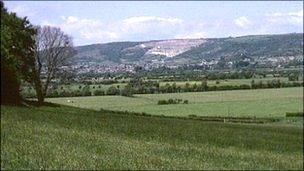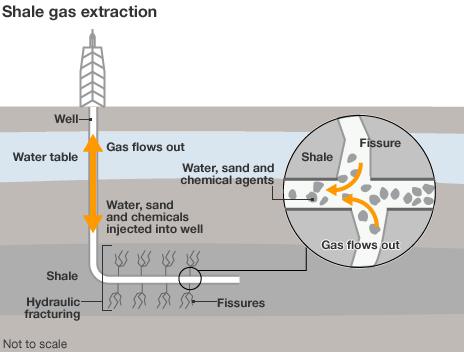Mendip Hills bid to test for 'fracking' of shale gas
- Published

The Mendip Hills is a range of limestone hills to the south of Bristol and Bath, running east to west
Work is under way to test if a controversial method of extracting gas could be used on the Mendip Hills.
Environmental campaigners have said the process, called fracking, is dangerous.
One of the firms behind the plans, UK Methane, said the process was "strictly governed" and it would not be allowed to do anything that was not safe.
The company said that there was "potential" and it will be applying for permission to test drill. It added the extraction could create jobs.
Exploration holes
"I know there's been a lot of controversy over fracking shales," said Gerwyn Williams, UK Methane director.
"But if you go by the government select committee's report, and the Environment Agency comments, then it is quite safe.
"It is all very, very strictly governed. We wouldn't be allowed to do anything that wasn't safe.
"If the mineral drilling proves positive then there could be fracking if we went for shale gas extraction.
"There could be gas resources that do not require fracking, it's only by drilling the exploration holes that we will be able to determine what is or isn't there."
UK Methane, which is working with Australian company Eden Energy, said the extraction could create "thousands" of jobs.
Tiny explosions
The companies involved have so far only carried out desk-based work but they are in the process of applying for planning permission to test drill, although they will not give specific locations.
If gas extraction does go ahead, fracking - more technically known as hydraulic fracturing - could be used.
Fracking occurs when water and sand is forced down a pipeline, creating tiny explosions which shatter hard shale rocks and release gas around 3,048m (10,000ft) underground.
"I've got specific concerns that the right checks and balances haven't been put in place before any question of extractions has been commenced," said Nigel Taylor, from the Mendip Hills Area of Outstanding Natural Beauty group.
"We're sitting on a very, very frail area of the Mendip Hills. [It's] full of caves underground.
"There are massive water sources and resources underneath the Mendips, which supply the cities of Bristol, Weston-super-Mare, Bath, and it's essential that we get this right at the start."
A scheme in Lancashire was stopped earlier this year after it was blamed for causing two earthquakes.
In the US, campaigners have said a leak of shale gas into the water supply had caused tap water to become flammable and catch fire.
'Minimal impact'
Last month, the Commons Energy and Climate Change Committee backed the fracking process and said there was nothing inherently dangerous about the technique and no evidence that it provides a direct risk to water supplies.
Mr Taylor added: "In the Lancashire situation they used one billion gallons of water for the fracking process. Where does that water go?," he said.
"In that fracking water can be various chemicals like arsenic. There's not enough research that has been done into this.
"The Mendip Hills themselves are interlaced with a large amount of fractures.
"Any attempt to drill and free up methane gases, it's too soon to say how that could pollute the Mendips and that will feed into our water supplies for generations."
Both Eden Energy and UK Methane have government licences to test drill on the Mendip Hills but now need to apply for planning permission.
UK Methane said any work would have a minimal impact on the surrounding landscape.
Mr Williams said any initial drilling would last six or seven weeks, with any further, deeper work taking around four months with most of the work being carried out below ground.

- Published8 June 2011
- Published6 June 2011